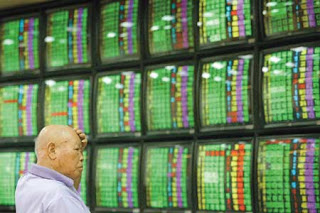 On Oct. 24, the Deutsche Presse Agentur (DPA) wire agency reported that the Taiwanese stock exchange, the TAIEX, had dropped nearly 3 percent as a result of a mass rally organized by (as it put it) the “right wing” and “separatist” Democratic Progressive Party (DPP) for Oct. 25. What the DPA failed to mention, however, was that on the same day, every single stock market in Asia was down, with much more serious drops recorded in Japan (7 percent) and South Korea (9 percent).
On Oct. 24, the Deutsche Presse Agentur (DPA) wire agency reported that the Taiwanese stock exchange, the TAIEX, had dropped nearly 3 percent as a result of a mass rally organized by (as it put it) the “right wing” and “separatist” Democratic Progressive Party (DPP) for Oct. 25. What the DPA failed to mention, however, was that on the same day, every single stock market in Asia was down, with much more serious drops recorded in Japan (7 percent) and South Korea (9 percent).No stock analyst worth his weight, let alone critical thinkers, would ever link the drops across Asia with the demonstration in Taipei. It would be equally preposterous to think that the drop in the TAIEX was a result of the demonstration, given that the Taiwanese bourse was being driven down by regional and global trends that had begun weeks earlier. Still, in its report, DPA was establishing a direct correlation between “separatist extremism” and a sagging stock exchange. (Surely, if the demonstration had been such a big deal, the drop in the TAIEX would have been more severe, not less, than in other Asian bourses.)
This highly creative — and downright false — reporting was preparing the terrain for yet another piece of confabulation published today by DPA. This time around, however, the TAIEX was up more than 6 percent, and the wire agency was tying it to … “positive signs in Taiwan-China ties” ahead of “important dialogue from Nov. 3 to Nov. 7 to discuss expanding ties” and a seemingly “goodwill gesture” by Beijing in allowing Taiwan to send former KMT chairman Lien Chan (連戰) as its representative to the APEC Forum in Lime, Peru, next month. (A “goodwill” gesture it certainly isn’t, as the pro-China Lien has visited China on a number of occasions, met its leaders, and is on good terms with Chinese President Hu Jintao, who will also attend the Forum.)
Once again, the DPA failed to provide context and to mention that markets across Asia were climbing sharply, with the bourse in Hong Kong shooting up 12.8 percent, Tokyo almost 10 percent and Seoul 12 percent. Australia, Singapore and the Philippines added 4 percent or more, while Russia's two main indices were also up sharply.
If we were to follow the DPA’s logic, those markets would have been reacting to the so-called “positive ties” between Taipei and Beijing, an altogether farcical proposition. Asian markets were up for a number of reasons, including a US interest cut and a currency deal with South Korea. Like any other bourse, the TAIEX was simply following the trend and, unlike what the DPA would have us believe, the rise had little to do with politics.
As many foreign agencies did when the DPP was in power, the tendency continues to be to discredit the pan-greens on the economy. Back then, the DPP was “mismanaging” the economy, and now that it is in the opposition, its demonstrations are drawing down the stock market. It seems that no matter what the DPP does, it isn’t good for the economy.
Did anyone say bias in the KMT’s — and unification’s — favor?

No comments:
Post a Comment